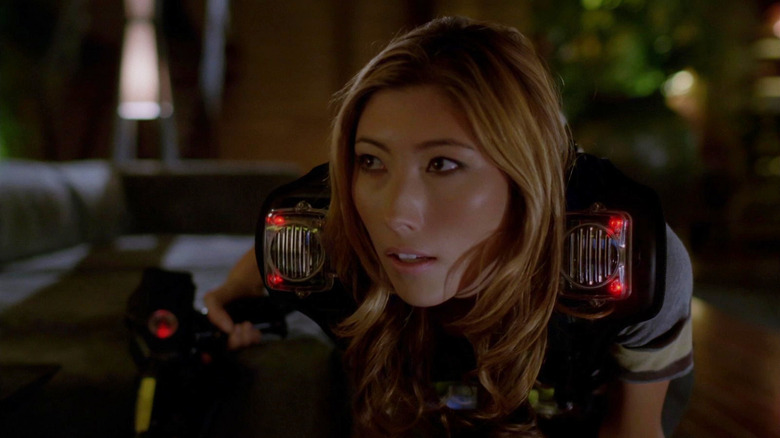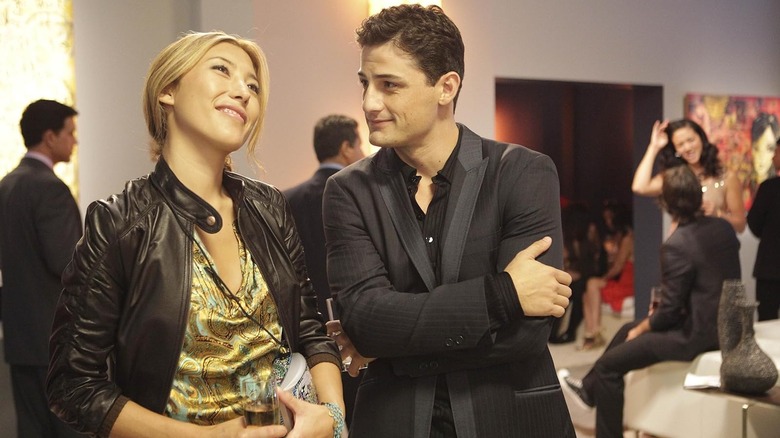Severance's Creator Knows The Gemma Episode Is Similar To This Canceled Sci-Fi Gem
This article contains spoilers for "Severance."
Praise Kier! Dichen Lachman is finally getting her time in the spotlight. Like so many other Australian actors that ultimately made the jump to Hollywood, Lachman cut her teeth on the perennial Aussie soap opera "Neighbors." Yet, despite having since become a prolific veteran of American television, she's been curiously wasted in blink-and-you'll-miss-them roles in tentpoles like "Jurassic World Dominion" and "Kingdom of the Planet of the Apes." Thankfully, that's not the case with "Severance," Dan Erickson's engrossingly trippy sci-fi series about modern corporations and their never-ending search for new ways to exploit their workers.
Speaking of the devil, the nefarious biotech giant Lumon Industries and its "severing" tech took on whole new shades of disturbing in "Severance" season 2, especially when it came to Lachman's character ... or, should we say, characters. As you may recall, the actor made her debut on the series as Ms. Casey. With her almost ethereal manner and patience, the Lumon wellness counselor is ideally suited for dealing with the company's childlike innies, i.e. the personalities of Lumon's "severed" employees that know nothing of life outside of their job. In time, though, it came to light that Ms. Casey herself is actually the innie of one Gemma Scout, the believed-dead wife of tormented Lumon employee Mark Scout (Adam Scott).
Things took an even more troubling turn in season 2's "Chikhai Bardo." There, we learned that Lumon has not only created multiple innies for Gemma, but has also been essentially holding her prisoner as it subjects her various innies to painful experiments designed to test the limits of the severing technology. Of course, if you're a longtime Lachman fan, the idea of her basically playing several individuals inhabiting the same body will ring a bell, as Erickson is all too aware.
Before she was severed, Dichen Lachman visited Joss Whedon's Dollhouse
Prior to assembling Earth's Mightiest Heroes, but after sending off his merry band of space cowboys with the "Firefly" follow-up film "Serenity," Joss Whedon got philosophical with his short-lived sci-fi creation "Dollhouse." The Fox series, like "Severance," centers on a shady corporation — in this case, the shadowy Rossum — that specializes in meddling with the minds of its workers. As implied by its title, Rossum programs its employees, aka Actives or Dolls, with temporary alternate personalities and skill sets, which in turn allows its clients to treat these Dolls like, well, living dolls specially designed to fulfill their wildest fantasies.
Notably, Rossum's Dolls also form a more permanent alternate personality that knows nothing of the world beyond their workplace, aka their "Dollhouse," in addition to their regular persona, which retains no memories of their experiences working for Rossum. In other words, their Doll personalities are the innies to their outies, i.e. the personalities of Lumon's employees that only remember the events of their personal lives on "Severance."
This brings us to Lachman, who co-starred across both seasons of "Dollhouse" from 2009 to 2010 as the Doll Sierra (whose actual name is Priya Tsetsang). When Alan Sepinwall remarked on the parallels between Whedon's show and "Severance" during his interview with Erickson for Rolling Stone (specifically what happens to Gemma in "Chikhai Bardo"), the showrunner revealed this was somewhat incidental:
"Yeah. I had seen 'Dollhouse.' But it's funny: It didn't really occur to me until we were well into writing the episode that it was a little bit similar in concept. But we knew that Dichen was going to be able to do that very well."
Dollhouse and Severance are only really similar on the surface
Erickson's response makes sense. For all of their surface-level similarities, "Severance" and "Dollhouse" are pretty dramatically different. The latter only briefly touches on the concept of labor exploitation; like the contestants in "Squid Game," people are usually in some kind of dire straits when Rossum convinces them to "volunteer" to become a Doll with the promise of a hefty payday in exchange for their services. Sierra, admittedly, is an exception to this rule, but even then, her storyline has more in common with that of Evan Rachel Wood's Dolores Abernathy from the earlier seasons of "Westworld" than Gemma's. (The common denominator being they're all quite dark in their own ways.)
For the most part, however, "Dollhouse" merges the empowerment and autonomy themes Whedon is known for with existential musings, particularly the idea that Dolls still retain parts of their temporary personalities after they're wiped clean. Likewise, more powerful emotions are shown to transcend the Dolls' programming, which is why Sierra is always falling in love with her fellow Doll Victor (Enver Gjokaj), and vice versa, even when they're programmed with different personas.
There's also an intriguing meta-element to "Dollhouse." After all, the relationship between the Dolls and the folks who run Rossum is more than a little like the real-life one between actors and their bosses. Unfortunately, it's a concept that doesn't really get the attention it warrants on the show, as Whedon tends to shy away from fully reckoning with its darker implications. (Notably, when certain Rossum employees use the Dolls to satisfy their own personal needs, they're not vilified the way their clients are.) Then again, self-criticism was never Whedon's strong suit, was it?
"Severance" is streaming on Apple TV+.


